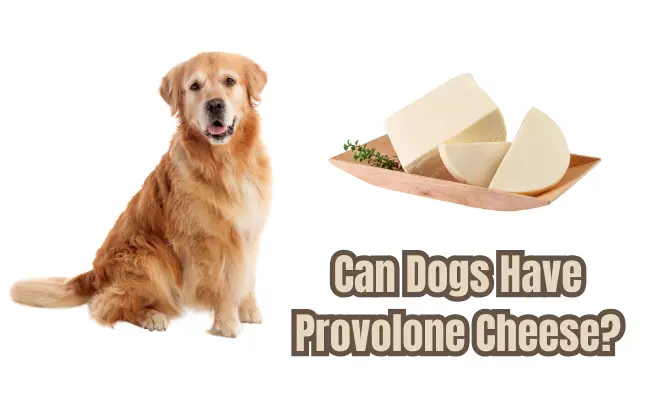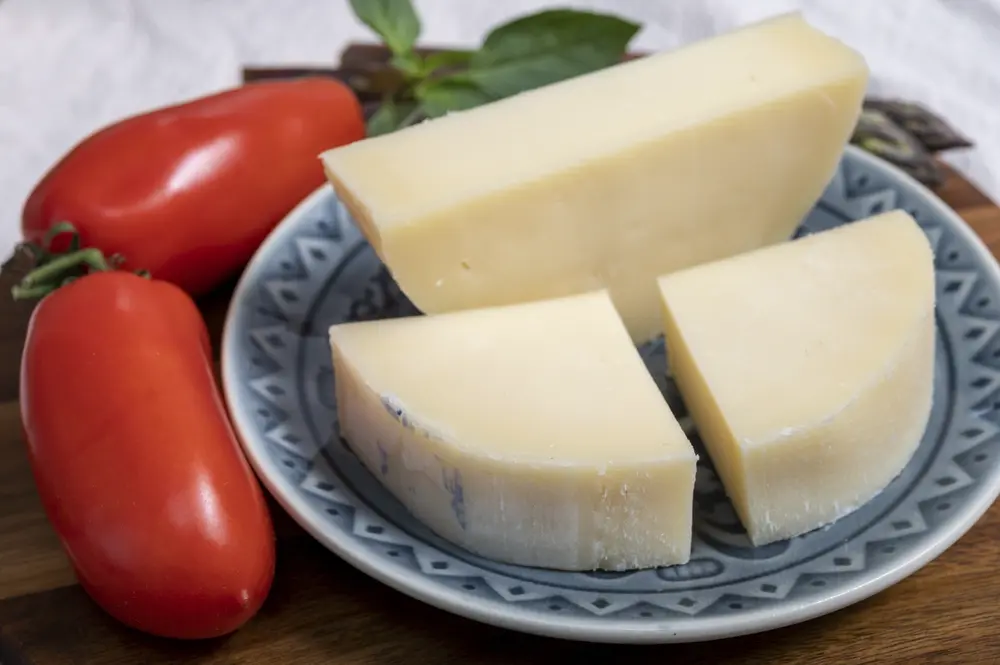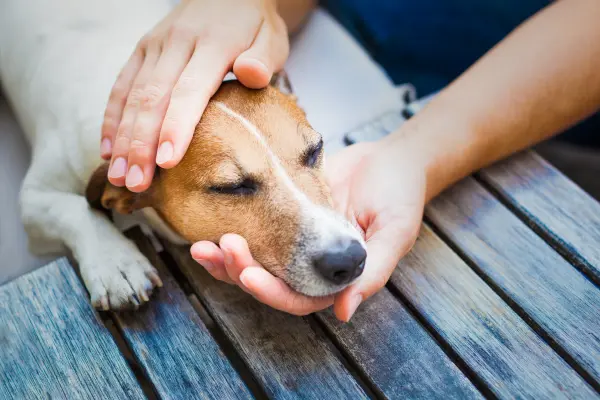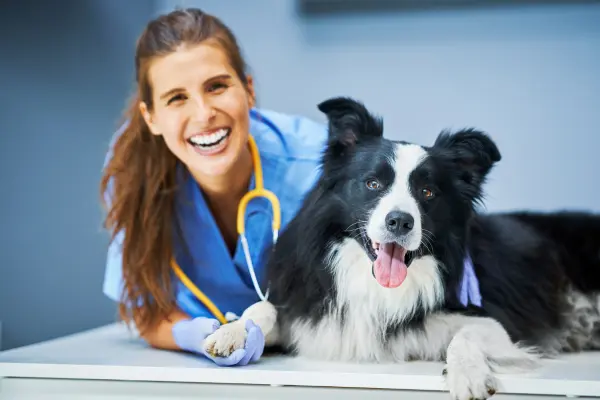
Cheese, a delectable dairy delight, holds a special place in our daily diet, adding flavor and nutrition to a variety of dishes. Whether it’s sprinkled atop a hearty sandwich or melted into a creamy pasta sauce, cheese has become a staple ingredient in our culinary repertoire. But as a devoted dog owner, you may find yourself contemplating whether it’s safe to share this savory treat with your furry companion. In this article, we’ll explore the question: ‘Can dogs have Provolone cheese?’ We’ll delve into the world of cheese and dogs, specifically focusing on whether dogs can safely enjoy Provolone cheese. We’ll discuss the nutritional benefits and potential risks, providing you with the knowledge you need to make informed decisions about including Provolone in your dog’s diet.
What is Provolone?

Provolone is a cheese crafted with great skill and unwavering dedication. It begins as curd that is stretched and molded, initially too soft to be placed on store shelves. This semi-hard cheese comes in various shapes and sizes. When you first taste it, you’ll notice hints of nuts and a subtle saltiness, giving it a smooth, mild, and characterful flavor.
Provolone finds its roots in northern Italy, particularly in the Val Padana region. The fresh milk for making Provolone comes from Friesian cows that graze near the Po River. These cows play a vital role in creating the cheese’s velvety and rich taste.
Whether melted or enjoyed cold, Provolone offers a versatile range of flavors and textures in various culinary applications.
Can Dogs Have Provolone Cheese?
Yes, it’s perfectly fine for dogs to have plain Provolone cheese. However, it’s important to avoid sharing any Provolone cheese that has garlic, onion, or avocados added to it with your furry friend. These extra ingredients can be harmful and lead to poisoning in dogs. Provolone is a dairy product, and like other cheeses, it can be a tasty treat for your canine companion. However, there are some important considerations to keep in mind:
- Lactose Intolerance: Many dogs are lactose intolerant, which means they have difficulty digesting lactose, the sugar found in milk and dairy products. This can lead to gastrointestinal upset, including diarrhea and gas. If your dog shows signs of lactose intolerance, it’s best to avoid giving them Provolone or any other cheese.
- High Fat Content: Provolone cheese is relatively high in fat, and excessive consumption of fatty foods can lead to pancreatitis in dogs. This is a painful and potentially serious condition that affects the pancreas. Therefore, Provolone should only be given as an occasional treat and not as a regular part of your dog’s diet.
- Sodium Concerns: Cheese, including Provolone, can be quite salty. Excess sodium intake can lead to increased thirst and urination, as well as potential health issues like high blood pressure. It’s important to monitor your dog’s salt intake, and if you choose to give them Provolone, do so in small amounts.
- Choking Hazard: Provolone cheese can be sticky and may pose a choking hazard, especially if your dog tries to swallow a large piece without properly chewing it. To prevent this, cut the cheese into small, manageable pieces.
- Individual Tolerance: Every dog is different, and their tolerance for Provolone or any cheese can vary. It’s essential to observe your dog’s reaction when introducing new foods into their diet. If you notice any adverse effects, discontinue feeding them Provolone.
In summary, while dogs can have Provolone cheese as an occasional treat, it’s important to be mindful of their individual tolerance, potential lactose intolerance, and the high fat and sodium content. Always consult with your veterinarian if you have concerns about your dog’s diet or specific dietary restrictions.
Read More: Can Dogs Eat Egg Rolls?
Benefits of Provolone Cheese for Dogs
Provolone cheese, a delicious and versatile dairy product, can be more than just a tasty treat for your canine companion. While it’s essential to offer it in moderation and with certain considerations, Provolone cheese does have some potential benefits for dogs.
- Nutrient-Rich: Provolone cheese is a good source of essential nutrients that can benefit your dog’s health. It’s notably rich in calcium and protein, which are crucial for maintaining strong bones, muscles, and teeth. These nutrients play a vital role in your dog’s overall well-being.
- Low Lactose Content: One of the significant concerns with feeding dogs dairy products is lactose intolerance. Many dogs have difficulty digesting lactose, the sugar found in milk. However, Provolone cheese has relatively low lactose content compared to some other cheeses. This means that it’s less likely to trigger symptoms of lactose intolerance in dogs. It can be a more digestible option for dogs with mild lactose sensitivity.
- Versatile Treat: Provolone cheese can be used in various ways as a treat or training reward for your dog. You can cut it into small, manageable pieces and use it during obedience training or as an occasional snack. Its flavorful taste can make it an enticing reward for your pup.
- Enjoyment: Dogs, like humans, appreciate variety in their diet. Offering Provolone cheese as an occasional treat can add diversity to their taste experiences. It can be an excellent way to provide a change from their regular dog food.
- Bonding Opportunity: Sharing a small piece of Provolone cheese with your dog can also be a bonding experience. It can create positive associations with you and reinforce the bond between you and your furry friend.
Important Considerations:
While Provolone cheese can have benefits for dogs, it’s crucial to exercise caution:
Serve it in moderation to avoid excess fat and calorie intake.
Always check the ingredients to ensure it’s plain Provolone cheese without harmful additives like garlic or onions.
Monitor your dog for any signs of digestive upset or allergies when introducing new foods into their diet.
Provolone cheese can offer some nutritional benefits and serve as a tasty and versatile treat for dogs. However, it should be given in moderation and should not replace their regular, balanced diet. If you have concerns about your dog’s diet or specific dietary restrictions, consult with your veterinarian for personalized guidance.
Related Post: Can Dogs Eat Cheerios? Safe or Risky Snacking?
Risks of Provolone Cheese for Dogs

While Provolone cheese can offer some potential benefits for dogs, it’s equally important to be aware of the associated risks. Just like with any human food given to our furry companions, there are potential pitfalls that dog owners should consider before sharing Provolone cheese with their pets.
- High Fat Content: Provolone cheese is relatively high in fat, which can be problematic for dogs. Excessive fat consumption can lead to pancreatitis, a painful and potentially life-threatening condition that affects the pancreas. It’s essential to avoid overindulging your dog in fatty foods like Provolone to reduce this risk.
- Lactose Sensitivity: While Provolone cheese has lower lactose content compared to some other dairy products, it’s not entirely lactose-free. Dogs vary in their tolerance for lactose, and some may still experience digestive upset if they have lactose sensitivity. Common symptoms include diarrhea, gas, and stomach discomfort. If your dog is lactose intolerant, it’s best to avoid giving them Provolone cheese altogether.
- Sodium Concerns: Provolone cheese, like many cheeses, can be quite salty. Excess sodium intake can lead to increased thirst, urination, and potential health issues like high blood pressure. To prevent sodium-related problems, limit your dog’s intake of salty foods, including Provolone.
- Choking Hazard: Provolone cheese can be sticky and may pose a choking hazard, especially if your dog tries to swallow large pieces without properly chewing them. To minimize this risk, always cut the cheese into small, manageable portions before offering it to your dog.
- Additives and Seasonings: Some varieties of Provolone cheese may contain ingredients like garlic or onions, which are toxic to dogs. Always check the label and avoid any Provolone cheese with harmful additives or seasonings.
- Allergies: Just like humans, dogs can have food allergies or sensitivities. Introducing new foods, including Provolone cheese, may lead to allergic reactions in some dogs. Watch for signs of allergies, such as itching, skin problems, or digestive issues, when introducing new foods into your dog’s diet.
- Obesity: Feeding Provolone cheese in excess can contribute to obesity in dogs due to its high-fat and calorie content. Obesity is a significant health concern for dogs and can lead to various health problems, including joint issues and heart disease.
While Provolone cheese can be enjoyed by dogs in moderation, it’s crucial to be aware of the potential risks associated with its consumption. To ensure your dog’s safety and well-being, it’s best to consult with your veterinarian before adding any new foods to their diet, including cheese. Always prioritize a balanced and appropriate diet for your furry friend to maintain their health and happiness.
Related Post: Can Dogs Eat Yellow Rice?
How to Safely Serve Provolone Cheese to Dogs: Tips and Guidelines

Sharing a bite of cheese with your dog can be a delightful way to bond and treat them now and then. While Provolone cheese can make for a tasty indulgence, it’s essential to approach it with care. In this guide, we’ll explore the dos and don’ts of serving Provolone cheese to your furry friend. From portion control to monitoring for reactions, these tips will help you ensure a safe and enjoyable cheese treat for your canine companion.
- Choose Plain Provolone: Opt for plain Provolone cheese without any additional ingredients or seasonings. Plain Provolone is generally safe for dogs when given in small amounts occasionally.
- Caution with Pancreatitis: If your dog has a history of pancreatitis or is prone to this condition, it’s best to avoid giving them Provolone cheese altogether. The high-fat content in cheese can exacerbate pancreatitis symptoms.
- Start Small: When introducing Provolone cheese to your dog’s diet, start with a tiny amount. This allows you to gauge their reaction and ensure they tolerate it well. Watch for any signs of discomfort or digestive upset.
- Monitor for Reactions: After giving your dog Provolone cheese, closely monitor them for several hours. Look out for any adverse reactions such as diarrhea, vomiting, gas, or changes in behavior. If any negative symptoms occur, discontinue feeding them cheese.
- Maintain Moderation: If your dog tolerates Provolone cheese without any issues, it can be given in moderation as an occasional treat. Emphasize the “occasional” aspect, as cheese should not become a regular part of their diet. Moderation is key to preventing potential health problems associated with excess fat and sodium intake.
- Portion Control: When offering Provolone cheese as a treat, be mindful of portion sizes. Cut it into small, bite-sized pieces to prevent overindulgence. Remember that even a small amount of cheese can be a satisfying treat for your dog.
- Balance with Their Regular Diet: Cheese should complement your dog’s balanced and appropriate dog food, not replace it. Ensure that their primary diet meets their nutritional needs, and use cheese sparingly as an occasional addition.
- Consult Your Veterinarian: If you have any doubts or concerns about feeding Provolone cheese to your dog, it’s always a good idea to consult with your veterinarian. They can provide personalized guidance based on your dog’s specific dietary requirements and health conditions.
By following these guidelines and practicing responsible feeding, you can offer Provolone cheese to your dog as an occasional and safe treat while prioritizing their overall health and well-being.
Related Post: Can Dogs Eat Orange Chicken?
Conclusion
In conclusion, dogs can have Provolone cheese in moderation, but caution is essential. Provolone cheese offers nutrients and can be a versatile treat but should be given sparingly. Watch out for its high-fat content, potential lactose issues, sodium levels, choking hazards, and harmful additives. Always consult your vet for guidance. Enjoy sharing Provolone cheese with your dog as an occasional, safe, and enjoyable treat while prioritizing their overall health.
Related Post:



